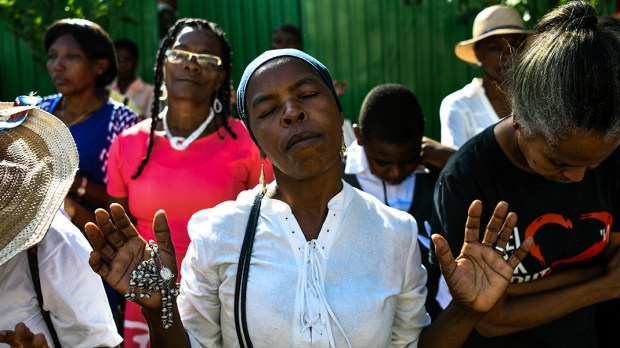The bishops of Haiti have launched a year of prayer in the face of a dire political situation in the Caribbean island nation.
Haiti has been rocked by protests in recent months, some of them violent, to urge President Jovenel Moïse to step down. Moïse has been accused of embezzling hundreds of thousands of dollars of government funds earmarked for badly needed social programs.
Time magazine reported that a government program, PetroCaribe, is at the center of protesters’ anger:
Under PetroCaribe, a strategic oil alliance signed with nearby Venezuela in 2006, Haiti—the poorest country in the Americas—saved precious dollars by borrowing fuel from its oil-rich neighbor and deferring payment for up to 25 years. Governments were supposed to use the extra money to develop the economy and fund social programs. Instead, at least $2 billion (equivalent to almost a quarter of Haiti’s total economy for 2017) went missing and Haitians saw few of the promised benefits, according to protesters and local media. Haitian taxpayers still owe Venezuela billions of dollars for the borrowed oil.
In a communiqué, the Haitian Bishops’ Conference said their nation’s “misery has become so sharp and the insecurity so destabilizing that the tree of hope has been torn from the ground.” The lack of hope “in a people has always been considered an absolute evil.” Alongside this, there is an “evil endemic corruption—gangrenous for the country.”
Among these three evils, there is a relationship of cause and effect, they said. “These three capital evils,” the bishops wrote, “will be at the center of our prayer throughout the year 2019-2020, but above all at the center of our worship. Hasn’t the Lord always listened to the voice of His people crying for him? Aren’t we his people, His flock?”
The year of prayer will run until Pentecost 2020. The Bishops’ Conference said that in order to emphasize the ecclesial dimension of the year of prayer, each diocesan bishop is to “regularly organize a great celebration of worship in his diocese.”
On a grassroots level, the bishops hope that “each Haitian, each prayer group will try, during moments of worship, to consecrate and restore to God the destiny of our country and our people.”

